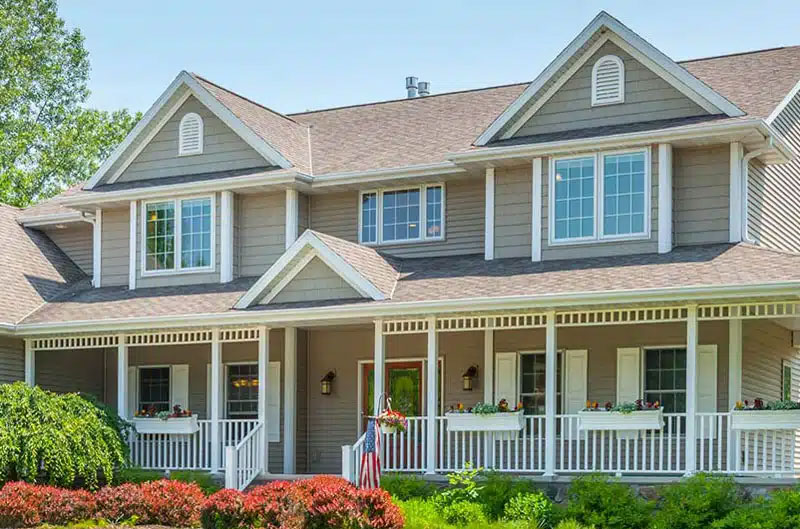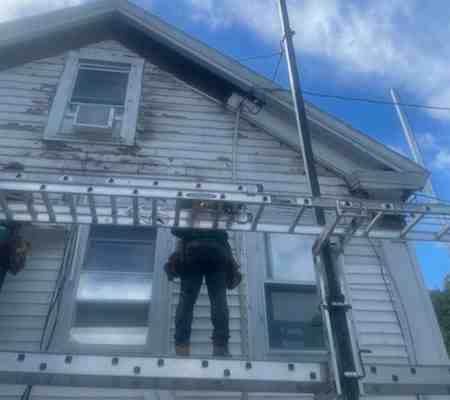Introduction
How much do contractors charge to replace windows? This is a question many homeowners find themselves asking when they consider upgrading their home’s windows. The cost to replace windows can vary greatly depending on several factors including the type of window, material, and installation complexity.
Here are some quick numbers to keep in mind:
- Average Project Cost: $500 – $3,000
- Federal Tax Credits: Up to 30% of installation costs, maximum $600
- Bulk Discounts: Possible savings if replacing multiple windows
Read on to understand the full picture.
Replacing your windows is not just about improving aesthetics; it’s also a smart way to boost energy efficiency and save on utility bills. Contractors often provide fast installations and include workmanship warranties, safeguarding your investment. According to our survey, 58% of homeowners who used professional installers did so to protect their investment with a warranty.
When planning your window replacement project, consider working with a local contractor to get accurate estimates and potentially bulk discounts. This can help you plan your budget more effectively, ensuring you know what to expect before you start your project.

Average Costs of Window Replacement
Replacing windows can be a significant investment, but understanding the average costs can help you plan your budget effectively. Let’s break down the material and labor costs involved in window replacement.
Material Costs
The cost of window materials varies widely based on the type you choose. Here’s a quick look at the average costs for different materials:
Aluminum Windows
– Cost Range: $300 – $800
– Average Cost: $450
– Pros: Affordable, durable, low maintenance.
– Cons: Less energy-efficient compared to other materials.
Vinyl Windows
– Cost Range: $300 – $900
– Average Cost: $550
– Pros: Energy-efficient, durable, low maintenance.
– Cons: Limited style options compared to wood.
Wood Windows
– Cost Range: $700 – $1,800
– Average Cost: $1,250
– Pros: Classic appearance, highly customizable.
– Cons: Higher maintenance, more expensive.
Composite Windows
– Cost Range: $600 – $1,500
– Average Cost: $900
– Pros: Durable, energy-efficient, mimics wood appearance.
– Cons: Higher cost than vinyl and aluminum.
Fiberglass Windows
– Cost Range: $700 – $1,400
– Average Cost: $1,100
– Pros: Highly insulating, weather-resistant, low maintenance.
– Cons: Higher initial cost.
Energy-efficient windows, such as those with Low-E coatings or gas-filled panes, can also impact costs. These options usually fall within the higher end of the cost ranges but offer potential savings on utility bills in the long run.
Labor Costs
Labor costs for window replacement can vary based on the complexity of the installation and the region where you live. Here’s a general breakdown:
Basic Labor
– Cost Range: $100 to $400 per window
– Average Cost: Around 15% of the total window replacement cost
– Includes: Setting the unit in the rough opening, shimming for level and plumb placement, securing the unit, insulating the perimeter, and securing house wrap.
Complex Installations
– Factors: Large, heavy, or irregularly shaped windows, hard-to-reach areas, custom windows, additional repairs.
– Cost: Higher due to increased labor time and potential need for specialized equipment.
Hourly Rates
– Range: $50 to $100 per hour, depending on the region and the contractor’s expertise.
– Note: Some contractors may charge a flat rate per window instead of hourly rates.
By understanding these costs, you can better plan your window replacement project and set realistic expectations for your budget.
Next, we’ll discuss the various factors that can influence these costs, helping you make informed decisions about your window replacement project.
Factors Influencing Window Replacement Costs
Several factors can significantly impact the cost of replacing windows in your home. Understanding these variables can help you plan your budget effectively.
Window Size and Type
Window Size
The size of the window plays a crucial role in determining the cost. Larger windows require more materials and labor, increasing the overall expense. For example, a standard 2-foot by 3-foot window will cost much less than a 10-foot by 6-foot bay window.
Window Type
Different types of windows come with varying price tags:
- Single-Hung: These are generally more affordable and simpler to install. They have a fixed top sash and a movable bottom sash.
- Double-Hung: Slightly more expensive than single-hung windows, these have two movable sashes, offering better ventilation.
- Casement: These windows are hinged on the side and open outward. They are more expensive due to their complex mechanism.
- Picture Windows: These large, fixed windows do not open and are often used for aesthetics and to allow more natural light. They can be pricey due to their size and the quality of the glass used.
Installation Complexity
Site Conditions
The condition of the site can add to the complexity and cost of the installation. For example, replacing windows on the second floor or higher will generally cost more due to the need for specialized equipment and increased labor time.
Custom Windows
Custom windows, which are made to fit unique sizes or shapes, can significantly increase costs. These windows often require special manufacturing processes and additional labor for installation.
Additional Repairs
Older homes or those with structural issues may require additional repairs before new windows can be installed. This can include fixing damaged frames, addressing moisture issues, or updating the trim. These repairs can add to both the material and labor costs.
Location
Your home’s location can also impact the cost of window replacement. According to Jay Sanders, a licensed contractor, “Areas with extreme weather conditions may require more durable, energy-efficient windows, increasing costs.” Additionally, regions with specific building codes, like hurricane-proof windows in coastal areas, can drive up prices. Labor and material costs also vary by region, reflecting the local cost of living and availability of skilled labor.
Understanding these factors can help you make informed decisions and set a realistic budget for your window replacement project.
Next, we’ll explore whether it’s cheaper to replace all your windows at once.
Is It Cheaper to Replace All Windows at Once?
If you’re considering replacing your windows, you might be wondering if it’s cheaper to do it all at once. The short answer is: yes, it often is cheaper. Here’s why:
Cost Savings
Replacing all your windows at once can lead to significant cost savings. One major reason is the reduced labor costs. When contractors replace all windows in one go, they can work more efficiently, reducing the total time and labor required. This efficiency translates to lower overall costs for you.
Bulk Discounts
Many window manufacturers and installers offer bulk discounts for large orders. According to our research, some companies provide discounted rates for buying in bulk. This means that if you replace all your windows at once, you might qualify for these savings, which can substantially lower your per-window cost.
Long-Term Benefits
Beyond immediate cost savings, replacing all your windows at once can have long-term benefits. New windows can improve your home’s energy efficiency, which can lower your energy bills. According to Energy Star, using certified windows can save you an average of 12% on your energy bills annually. This means more money in your pocket over time.
Additionally, new windows can increase your home’s value. A more energy-efficient and visually appealing home is attractive to potential buyers, potentially giving you a better return on your investment if you decide to sell.
Simplified Process
Replacing all windows at once simplifies the process. Instead of dealing with multiple installations over time, you get everything done in one project. This means less disruption to your daily life and a quicker path to enjoying the benefits of your new windows.

Expert Recommendations
Experts agree that replacing all windows at once is often the best approach. Derek Walczak notes, “Measuring for replacement windows and the installation can be tricky if you’ve never done it before. We always recommend hiring a contractor with experience in window replacements or having the company you are purchasing from take the measurements and perform the install.” This advice underscores the importance of professional installation and the potential savings from doing it all at once.
In summary, while replacing all your windows at once requires a larger upfront investment, the and simplified process make it a smart financial decision for many homeowners.
Next, let’s dive into how much contractors typically charge to replace windows.
How Much Do Contractors Charge to Replace Windows?
When replacing windows, understand how much contractors charge to replace windows. Contractor rates can vary widely based on several factors, including location, window type, and installation complexity.
Regional Variations
State-Specific Costs: The cost of window replacement can differ significantly from one state to another. For instance, areas with extreme weather conditions often require more durable, energy-efficient windows, which can increase costs. According to Jay Sanders, a licensed contractor, “Certain regions have specific building codes, such as hurricane-proof windows in coastal areas, which can drive up prices.”
Urban vs. Rural: The cost of labor and materials can also vary between urban and rural areas. Urban areas tend to have higher costs due to the increased demand and higher living expenses. Conversely, rural areas might offer lower rates, but the availability of skilled labor may be limited.
Local Market Rates: Local market conditions also play a crucial role. In areas with a high cost of living, such as major cities, you can expect to pay more for window replacement services compared to regions with a lower cost of living.
Typical Contractor Charges
Per Window Cost: On average, window replacement costs range from $1,105 to $1,730 per window. However, prices can vary based on the window type and materials used. For example, vinyl windows are more affordable, costing between $100 and $900, while fiberglass windows can range from $500 to $1,500.
Hourly Rates: Contractors typically charge by the hour for labor, with rates ranging from $45 to $150, depending on the region and the complexity of the installation. Basic installations in favorable conditions can cost between $319.62 and $488.20 per window.
Additional Fees: Additional costs may include the removal of old windows, debris disposal, and any necessary repairs to the surrounding structure. These fees can add up, so get a detailed estimate from your contractor. For example, the cost to remove old windows and dispose of debris can range from $14.175 to $16.125 per window.
Understanding these variations and typical charges can help you budget more accurately for your window replacement project. Next, we’ll answer some frequently asked questions about window replacement costs.
Frequently Asked Questions about Window Replacement Costs
What is the average labor cost to install a new window?
The average labor cost to install a new window varies but generally falls between $150 and $800 per window. This range depends on factors such as the window type, size, and installation complexity. For instance, installing a standard double-hung vinyl window is typically less costly than a custom-shaped bay window.
Labor costs can also be influenced by the age of your home. Older homes may have non-standard window sizes or structural issues that require extra labor. In some cases, labor costs can increase by an additional 20% to 30% due to these complications.
How much should you spend on replacement windows?
What you should spend on replacement windows depends on your priorities and budget. For a reliable yet budget-friendly option, a vinyl double-hung window with insulated glass is a good choice. These windows are energy-efficient and durable, typically costing between $100 and $900 per window.
If you’re willing to spend a bit more for better aesthetics and longevity, consider fiberglass windows. These are more attractive and won’t warp or rot like wood, costing between $500 and $1,500 per window.
Energy efficiency should be your top priority if you want a good return on investment. Energy Star-certified windows can save you money on energy bills and might qualify for federal tax credits, further reducing your overall costs.
How much do new windows cost in Illinois?
The cost of new windows in Illinois can vary widely based on several factors, including the type of window, materials used, and local labor rates. On average, you can expect to pay between $450 and $1,500 per window.
Urban areas like Chicago might have higher labor costs compared to rural areas. For example, a homeowner in Chicago might pay around $600 to $1,500 per window, while someone in a smaller town might spend between $450 and $1,200 per window.
Additionally, Illinois residents can benefit from various state and local incentives for installing energy-efficient windows. These incentives can help offset some of the costs, making window replacement more affordable.
Understanding these FAQs can help you make informed decisions about your window replacement project. For more detailed estimates tailored to your specific needs, consider consulting with a local contractor.
Conclusion
Replacing your windows is a significant investment that can enhance your home’s energy efficiency, comfort, and value. Understanding the costs involved and the factors that influence them can help you make informed decisions.
Heritage Exteriors LLC specializes in both replacement and new construction windows. We offer a wide selection of styles and materials to fit your needs and budget. Our expert installation ensures your windows perform flawlessly for years to come.
Final Tips
- Get Multiple Quotes: Always get estimates from several contractors to ensure you’re getting the best deal.
- Consider Bulk Replacement: If possible, replace all your windows at once to take advantage of bulk discounts and lower labor costs.
- Look for Incentives: Check for federal tax credits, state rebates, and local utility incentives to reduce your overall costs.
- Choose Energy-Efficient Options: Investing in energy-efficient windows can save you money on utility bills in the long run.
For more information on our window replacement services, visit our Windows & Doors page.
By following these tips and working with a trusted contractor like Heritage Exteriors LLC, you can ensure a smooth and cost-effective window replacement project.


